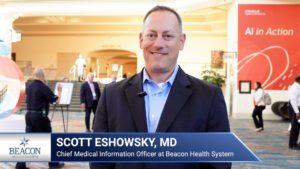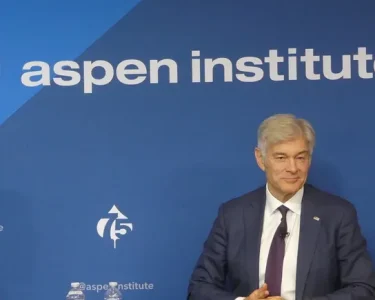This year has been full of stories of how AI scribes are reducing the time clinicians spend documenting patient encounters. That savings is often cited as the reason why so many clinicians are adopting the technology. But what if the time saved isn’t the main benefit of AI scribes? What if there is something just as beneficial?
Dr. Scott Eshowsky, Chief Medical Information Officer at Beacon Health System and a practicing family physician, shared how his organization is deploying Oracle Health’s Clinical AI Agent and how he believes that the reduction in cognitive load is even more beneficial than the time savings.
Key Takeaways
- Burnout relief comes more from cognitive load reduction than raw time savings. Even if the minutes saved aren’t huge, taking documentation off the clinician’s mental plate creates space for real patient focus and connection.
- Trust and accountability are central when deploying AI. Clinicians must review every AI-generated note. Without personal accountability, the risks outweigh the benefits.
- Integration will determine AI’s staying power. Beacon shifted to Oracle’s Clinical AI Agent because of its deep integration with the EHR, betting that speed of innovation depends on avoiding clunky interfaces.
The Real Win Is Mental Space
According to Dr. Eshowsky, saving ten minutes per visit isn’t the headline for AI scribe technology. What stands out is the relief that comes when the clinician’s mind is freed from multitasking. Instead of splitting attention between typing, remembering details, and maintaining eye contact, the AI handles the capture. “The cognitive burden relief of not having to sit there with your hands on a keyboard typing away…allowed us to better focus on the patient.”
That shift isn’t trivial. He noted how much energy clinicians spend just holding details in short-term memory until they can chart later, often long after the encounter has ended. By offloading that burden, physicians walk out of visits less drained and more present for the next patient.
One of his colleagues even admitted that after just a single day, she was “almost giddy” at how her quality of life had changed.
Guardrails Keep AI Grounded
AI scribes are only as safe as the clinicians reviewing their work. At Beacon Health System, adoption came with a non-negotiable: every line must be read before signing. “If you’re not willing to read every line of every note before you sign it, then you really shouldn’t be using this technology,” stated Dr. Eshowsky.
That stance comes from years of experience with transcription, voice-to-text, and other documentation shortcuts. In each case, there were always errors to catch—whether from a transcriptionist mishearing or NLP mangling a phrase. The difference with AI is that mistakes can be less predictable, making human oversight essential. Beacon Health System leaned into that history, framing AI not as a hands-off autopilot but as another tool that requires clinical judgment.
Integration Determines Staying Power
For Beacon Health System, choosing an AI partner wasn’t about who had the slickest demo. It was about who could embed the AI into the EHR without bolted-on interfaces that break over time.
“When Oracle announced that it [their Clinical AI Agent] was going to be fully integrated and was not going to require an interface, we felt Oracle was going to be much better positioned to advance us using AI than any other vendor,” said Dr. Eshowsky.
Beacon Health System had previously used a third-party scribe solution, but the extra layers slowed adoption. With Oracle Health, the confidence was that AI development would keep pace with clinical needs because the platform and the AI share the same foundation
The Quiet Payoff of AI Scribes
The story from Beacon shows how the value of AI scribes, like Oracle Health’s Clinical AI Agent, is more than just time saved. It’s not the stopwatch results that only matter, but also the shift in how clinicians think, feel, and connect in the exam room. Relief from cognitive overload and confidence in the integrity of the note are equally important.
As Dr. Eshowsky described, the payoff remains the same: less time spent buried in charts, more time looking patients in the eye, and even a reclaimed Sunday afternoon.
Learn more about Beacon Health System at https://www.beaconhealthsystem.org/
Learn more about Oracle Health at https://www.oracle.com/industries/healthcare/
Listen and subscribe to the Healthcare IT Today Interviews Podcast to hear all the latest insights from experts in healthcare IT.
And for an exclusive look at our top stories, subscribe to our newsletter and YouTube.
Tell us what you think. Contact us here or on Twitter at @hcitoday. And if you’re interested in advertising with us, check out our various advertising packages and request our Media Kit.



